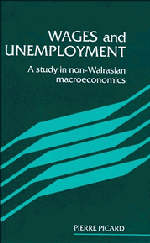Book contents
- Frontmatter
- Contents
- Acknowledgements
- Introduction
- 1 Price rigidities and temporary equilibrium
- 2 Wage rigidity and short-run macroeconomic equilibrium
- 3 Real wages and the inflation—unemployment dilemma
- 4 External constraint, oil shock and economic policy
- 5 Implicit contracts and unions
- 6 Introduction to efficiency wage models
- 7 Efficiency wages, employment fluctuations and fiscal policy
- 8 Labour market dualism, efficiency wages and optimal taxation
- Notes
- References
- Author index
- Subject index
4 - External constraint, oil shock and economic policy
Published online by Cambridge University Press: 28 October 2009
- Frontmatter
- Contents
- Acknowledgements
- Introduction
- 1 Price rigidities and temporary equilibrium
- 2 Wage rigidity and short-run macroeconomic equilibrium
- 3 Real wages and the inflation—unemployment dilemma
- 4 External constraint, oil shock and economic policy
- 5 Implicit contracts and unions
- 6 Introduction to efficiency wage models
- 7 Efficiency wages, employment fluctuations and fiscal policy
- 8 Labour market dualism, efficiency wages and optimal taxation
- Notes
- References
- Author index
- Subject index
Summary
This chapter develops an open economy version of the disequilibrium model introduced in chapter 2. We will contemplate an economy where domestic and foreign goods are imperfect substitutes and where prices are fixed at home and abroad in the short run. This open economy framework will allow us to consider a broader range of economic policy instruments, including the exchange rate or trade policy variables like tariffs and export subsidies. We will also emphasize some of the macroeconomic consequences of an oil shock by distinguishing the short-run effects with nominal rigidities and the long-run effects in an economy with real wage rigidities only.
In the first two sections we will present the model and characterize its fix-price equilibria and, in section 3, we will study the short-run macroeconomic policies. In section 4, we will consider a more specific version of the model where energy (oil) is individualized as a special imported good. We will first evaluate the short-run consequences of an increase in the price of oil. As we shall see, an oil shock may lead to a classical or Keynesian depression and thus it may entail inflationary or deflationary effects, depending on the relative values of the elasticities of the demand and supply of goods with respect to the price of energy.
- Type
- Chapter
- Information
- Wages and UnemploymentA Study in Non-Walrasian Macroeconomics, pp. 112 - 142Publisher: Cambridge University PressPrint publication year: 1993



